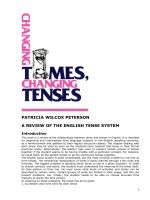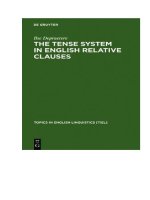Imperfect tense (El tiempo imperfectocoprete´ rito
Bạn đang xem bản rút gọn của tài liệu. Xem và tải ngay bản đầy đủ của tài liệu tại đây (121.99 KB, 13 trang )
Unit 7 (Unidad 7)
Imperfect tense (El tiempo
imperfecto/copret
´
erito [M])
Level 1
1.1 The imperfect tense (El tiempo imperfecto/copret
´
erito [M])
1.1 The imperfect tense
The imperfect tense is to be studied in conjunction with the preterit or past definite in
the next unit (unit 8), since they are frequently linked to each other.
In addition to the perfect tense (a compound tense) treated in Unit 5, Spanish has two
past tenses of simple form: the imperfect (pret
´
erito imperfecto or copret
´
erito as it is
known in Mexico) and the preterit. In regular verbs, the imperfect tense is obtained by
adding the following endings to the stem:
1st conjugation 2nd and 3rd conjugation
-aba -´ıa
-abas -´ıas
–aba -´ıa
–´abamos -´ıamos
–abais -´ıais
–aban -´ıan
Imperfect tense of the model verbs:
compraba vend
´
ıa viv
´
ıa
Sing. comprabas vend
´
ıas viv
´
ıas
compraba vend
´
ıa viv
´
ıa
compr
´
abamos vend
´
ıamos viv
´
ıamos
Plur. comprabais vend
´
ıais viv
´
ıais
compraban vend
´
ıan viv
´
ıan
NB You will note that the first and third person singular of these conjugations are the
same so sometimes, to avoid ambiguity, it may be necessary to use the pronouns yo, Ud.,
´
el and ella, although context would usually make this clear.
Theformation of the imperfect tense is different in only three irregular verbs. This
makes the learning of the imperfect quite easy. The three awkward verbs are:
ser: era eras era ´eramos erais eran
ir: iba ibas iba ´ıbamos ibais iban
ver: ve´ıa ve´ıas ve´ıa ve´ıamos ve´ıais ve´ıan
58
7 Imperfect tense
The fundamental value of the imperfect tense is to express continuance, as of an action
prolonged either in itself or by successive repetition. It conveys what was habitual, cus-
tomary, and describes qualities of persons or things, and the place or condition in which
they were, in the past. Yo compraba corresponds to the English I was buying, used to buy,
would buy and bought.Inthis sense, it is much simpler than the several English equivalents,
which makes life difficult for Spanish speakers learning English: and for English speakers
this compensates for the subjunctive, for instance, to be studied in unit 16.
Various ways in which the imperfect is used:
i To convey repeated and habitual past actions:
Yo iba siempre al mismo supermercado Ialwayswent to the same superstore
Los cuates (M)sedivert´ıan cada d´ıa en la
alberca (M)
The friends had fun every day in the
swimming pool
Fumaba una cajetilla diaria She smoked a packet a day
ii To describe an action that was in progress:
Le´ıa el peri´odico She was reading the newspaper . . .
Sal´ıa del colegio cuando... I was coming out of school when...
Est´abamos en la playa cuando . . . We were on the beach when...
Planeaban visitar Espa˜na They planned (were planning) to visit Spain
iii To describe physical, mental or emotional states in the past:
Estaba agotada She was exhausted
Los mellizos ten´ıan once a˜nos The twins were eleven years old
Ador´abamos la ´opera We adored opera
Hac´ıa sol todos los d´ıas It was sunny every day
Sab´ıan resolver todos los problemas They could solve all the problems
iv To refer to the time in the past:
Era la una It was one o’clock
Eran las cuatro y media It was half-past four
Exercises
Level 1
i Change the subject of the verb to the subject in brackets:
Example
Yo com´ıa carne una vez a la semana (
´
El) >
´
El com´ıa carne una vez a la semana
a Yo guardaba el dinero en una bolsa (Nosotras)
b Hablaban todos los d´ıas en el patio (Nosotras)
c Sal´ıamos muy temprano por la ma ˜nana (Yo)
d Ve´ıa la televisi´on todas las noches (Ellos)
e
´
Ibamos de compras el viernes (Ella)
f Yo correg´ıa los ejercicios por la tarde (Nosotros)
g Com´ıamos a la una (Yo)
h Ten´ıa que tomar el tren en Guanajuato (Ellas)
i Lavaban los platos despu´es de la cena (Yo)
59
ASTUDENT GRAMMAR OF SPANISH
ii Fill out the spaces with the imperfect tense of the verb indicated. Choose your own
subject.
Example
(
) comer el pescado (preferir) > Prefer´ıan comer el pescado
a (
) comprar el libro (querer)
b (
) leer este libro (pensar)
c (
) que salir (tener)
d (
)aver la tele (ir)
e (
)invitar a todo el mundo (querer)
f (
)ganas de nadar (tener)
g (
)iralmercado (necesitar)
h (
) jugar golf (M) (pensar) (not jugar al golf as in Spain)
iii Paired activity
Objective – Use of the imperfect tense
Method –The two participants ask each other ten questions in the imperfect tense.
Answers are also given in the imperfect tense.
Examples
PREGUNTA: ¿En d´onde viv´ıas en M´exico?
RESPUESTA: (Yo) Viv´ıa en Monterrey
PREGUNTA: ¿Qu´evend´ıa el comerciante en el mercado?
RESPUESTA: Vend´ıa fruta y verduras
The teacher will then bring the whole class together to discuss the findings
Level 2
2.1 Certain verbs with no English equivalent (Ciertos verbos sin equivalente
ingl
´
es)
2.1 Certain verbs with no English equivalent
There are a number of verbs which are used in the imperfect tense, and in the present
tense (see relevant section on the present tense in unit 4), and do not have a proper
English equivalent. Among these are: acostumbrar, soler, llevar, hacer.They are used in the
following way:
acostumbrar hacer algo to be accustomed to doing something
soler hacer algo (less used in M)tobeaccustomed to doing something
llevar tanto tiempo haciendo algo/hacer tanto tiempo (to) have been doing something for so much
time/to take so much time to do.../so
much time ago
Ejemplos
Acostumbraba desayunar huevos con jam´on I usually had ham and eggs for breakfast
Sol´ıa estudiar sobre todo por la ma˜nana I usually studied mainly in the morning
Estos melones sol´ıan ser muy ricos These melons used to be very good
60
7 Imperfect tense
Sol´ıan venir aqu´ı los martes They used to / would come on Tuesdays
Yo llevaba diez a˜nos en Veracruz cuando... I had been in Veracruz for ten years
when...
Llevaban tres d´ıas trabajando cuando... They had been working for three days
when...
Llevaba dos d´ıas sin fumar I had not smoked for two days
Hac´ıa seis meses que hab´ıa llegado He had arrived six months before
Hab´ıan salido para Brasil hac´ıa un mes They had left for Brazil a month before
Hac´ıa seis meses que hab´ıan sido capturados They had been captured six months
before
Exercises
Level 2
i Elije un verbo adecuado despu ´es de pero y ponlo (put it)enpret´erito imperfecto
Ejemplo
Yo quer´ıa ir al teatro pero (
) > Yo quer´ıa ir al teatro pero no ten´ıa tiempo
a Intentaba hallar (M)/encontrar trabajo pero (
)
b Procuraban resolver el enigma pero (
)
c Parec´ıan ingleses pero (
)
d Siempre lograban programar el viaje pero (
)
e Cada d´ıa evit´abamos las faenas de la casa pero (
)
f Siempre promet´ıas recogerme en tu carro pero (
)
g Preve´ıamos salir cada fin de semana pero (
)
h De vez en cuando insist´ıa en devolver el dinero pero (
)
ii Ibas a la sierra con frecuencia (solo o con amigos/as). Usando los verbos de abajo,
escribe una peque ˜na redacci ´on que relata las actividades que realizabas. Huelga
a˜nadir que el pret ´erito imperfecto es el tiempo dominante
ir, llamar, tener rentado/alquilado, salir, estar, ser, llegar, conducir, bajar, subir, aumentar,
sudar, hacer, cultivar, poder, querer, advertir, planear, prohibir.
iii Llena los espacios (M) / Rellena los blancos con soler, llevar o (desde) hacer, seg ´un el
sentido. Se trata de usar el pret ´erito imperfecto.
Ejemplo
Yo (
) diez a˜nos trabajando en la empresa cuando gan´elaloter´ıa > Yo llevaba...
a Nosotros (
) dos a˜nos en la casa cuando decidimos comprarla
b Ella (
) escritas dos cartas cuando tuvo que salir
c Ellos (
)mucho rato esperando en la estaci´on
d Yo (
) media hora en el hospital
e Yo (
) leer toda la tarde
f Estos melones (
) ser muy ricos pero ahora no son tan buenos
g T´u(
)venir aqu´ı cada fin de semana pero no vienes nunca ahora
h
´
El (
) manejar un carro (M) pero despu´es del accidente lo vendi´o
i Yo le´ıa un libro (
)mucho tiempo cuando son´oeltel´efono
j
´
El estudiaba (
)tresa˜nos cuando se licenci´o
iv Actividad en parejas
Objetivo –Eluso de los verbos acostumbrar, soler, llevar and hacer in the imper-
fect tense, y seg´un su uso en 2.1.
61
ASTUDENT GRAMMAR OF SPANISH
M
´
etodo – Cada uno de la pareja le hace al otro cinco preguntas en imperfecto. El otro
contesta y hace cinco preguntas a su vez
Ejemplos
PREGUNTA: ¿Qu´e sol´ıas hacer en Santa M´onica?
RESPUESTA: Sol´ıa nadar todos los d´ıas
PREGUNTA: ¿Ad´onde acostumbrabas ir de vacaciones?
RESPUESTA: Acostumbraba ir a Acapulco
Despu´es, el profesor re´une a todo el mundo para recabar (collect together) todas las preguntas
yrespuestas.
62









